He checked himself suddenly, and frightened me. I knew that John Fry's way so well.
"And father, and father—oh, how is father?" I pushed the boys right and left as I said it. "John, is father up in town? He always used to come for me, and leave nobody else to do it."
"Vayther 'll be at the crooked post, tother zide o' telling-house.[1] Her coodn't lave 'ouze by raison of the Chirstmas bakkon comin' on, and zome o' the cider welted."
He looked at the nag's ears as he said it; and, being up to John Fry's ways, I knew that it was a lie. And my heart fell like a lump of lead, and I leaned back on the stay of the gate, and longed no more to fight anybody. A sort of dull power hung over me, like the cloud of a brooding tempest, and I feared to be told anything. I did not even care to stroke the nose of my pony Peggy, although she pushed it in through the rails, where a square of broader lattice is, and sniffed at me, and began to crop gently after my fingers. But whatever lives or dies, business must be attended to; and the principal business of good Christians is, beyond all controversy, to fight with one another.
"Come up, Jack," said one of the boys, lifting me under the chin; "he hit you, and you hit him, you know."
"Pay your debts before you go," said a monitor,
- ↑ The "telling-houses" on the moor, are rude cots where the shepherds meet, to "tell" their sheep at the end of the pasturing season.
